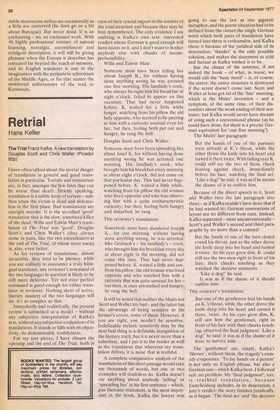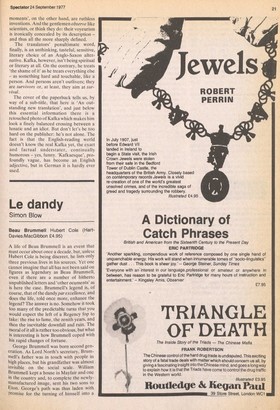Retrial
Hans Keller
The Trial Franz Kafka. A new translation by Douglas Scott and Chris Waller (Picador 80p) I have often talked about the mortal danger of translation in general and good translation in particular. Torture and translation are, in fact, amongst the few fates that can be worse than death. Strictly speaking, translation is a subtle form of torture subtlest when the victim is dead and defenceless in the first place. Bad translations are outright murder. It is the so-called 'good' translation that is the slow, unnoticed killer of the dead. Willa and Edwin Muir's translation of The Trial was 'good'. Douglas Scott's and Chris Waller's (they always come in pairs, like the two executioners at the end of The Trial, of whom more anon) is, alas, even better.
As for reviews of translations, almost invariably, they tend to be phoney: while you are unlikely to encounter a truly bilingual translator, any reviewer's command of the two languages in question is likely to be still more defective. Yet not even perfect command is good enough for either translator or reviewer. Nothing short of active, literary mastery of the two languages will do: it's as complex as that.
Immodestly and realistically, the present review is submitted as a model — without any subjective interpretation of Kafka's text, without any subjective evaluation of its translations. It stands or falls with its objectivity, its demonstrable truthfulness.
For my test pieces, I have chosen the opening and the end of The Trial, both in view of their crucial import in the context of the total structure and because they may be best remembered. The only evidence I am omitting is Kafka's own text: interested readers whose German is good enough will have access to it, and I don't want to bother anybody else with chunks of incomprehensibility.
Willa and Edwin Muir: Someone must have been telling lies about Joseph K., for without having done anything wrong he was arrested one fine morning. His landlady's cook, who always brought him his breakfast at eight o'clock, failed to appear on this occasion. That had never happened before. K. waited for a little while longer, watching from his pillow the old lady opposite, who seemed to be peering at him with a curiosity unusual even for her, but then, feeling both put out and hungry, he rang the bell.
Douglas Scott and Chris Waller: Someone must have been spreading lies about Josef K. for without having done anything wrong he was arrested one morning. His landlady's cook, who brought him his breakfast every morning at about eight o'clock, did not come on that particular day. This had never happened before. K. waited a little while, watching from his pillow the old woman who lived opposite and who was observing him with a quite uncharacteristic curiosity; but then, feeling both hungry and disturbed, he rang.
This reviewer's translation: Somebody must have slandered Joseph K., for one morning, without having done anything wrong, he was arrested. Mrs Grubach's — his landlady's — cook, who brought him his breakfast every day at about eight in the morning, did not come this time. That had never happened before. K. waited a little and saw, from his pillow, the old woman who lived Opposite and who watched him with a curiosity that was quite unusual for her — but then, at once astonished and hungry, he rang the bell.
It will be noted that neither the Muirs nor Scott and Waller are bad and the latter has the advantage of being sensitive to the former's errors, some of them. However, if you are right, you needn't be sensitive, Indefinable stylistic sensitivity may be the next best thing to a definable recognition of the literary truth, but it is never more than a substitute, and I put it to the reader as well as the translators that wherever my translation differs, it is mine that is truthful.
A complete comparative analysis of the translations of this short passage would take me thousands of words, but one or two examples will doubtless do. Kafka doesn't say anything about anybody 'telling' or 'spreading lies' in his first sentence — which, qua thematic statement, is the most important in the book. Kafka the lawyer was going to use the law as one gigantic metaphor, and the poetic situation had to be defined from the outset: the single German word which both pairs of translators have turned into three is verleurnden, and Kafka chose it because of the juridical side of its denotation; 'slander' is the only possible solution, and makes the statement as cold and factual as Kafka wished it to be.
But the climax of the sentence, if not indeed the book — of what, in music, we would call the 'basic motif' — is, of course, the arrest: the entire structure is destroyed if the arrest doesn't come last. Scott and Waller at least got rid of the 'fine' morning, which is the Muirs' invention — and a symptom, at the same time, of their discomfort about the weak ending of their sentence; but Kafka would never have dreamt of using such a conventional phrase (as he could have done, for there is a precise German equivalent for 'one fine morning').
The Muirs' last paragraph: But the hands of one of the partners were already at K's throat, while the other thrust the knife into his heart and turned it there twice. With failing eyes K. could still see the two of them, cheek leaning against cheek, immediately before his face, watching the final act. 'Like a dog!' he said: it was as if he meant the shame of it to outlive him.
Because of the direct speech in it, Scott did Waller turn the last paragraph into three— as if Kafka couldn't have done that if he had wanted to: German conventions of layout are no different from ours. Instead, Kafka separated — most unconventionally — Scott's and Waller's second and third paragraphs by no more than a comma!
But the hands of one of the men closed round his throat, just as the other drove the knife deep into his heart and turned it twice. As his eyes grew dim, K. could still see the two men right in front of his face, their cheeks touching as they watched the decisive moments.
'Like a dog!' he said.
It was as if the shame of it should outlive him.
This reviewer's translation: But one of the gentlemen laid his hands on K.'s throat, while the other drove the knife deep into his heart and turned it there, twice. As his eyes grew dim, K. still saw how the gentlemen, right in front of his face with their cheeks touching, observed the final judgment. 'Like a dog!' he said: it was as if the shame of it were to survive hitt.
The 'gentlemen' are, simply, Kafka's 'Herren'; without them, the tragedy's comedy evaporates. `To lay hands on a person' is not only an English phrase, but also a German one — which Kafka bent. I followed suit: no problem. My 'final judgment', too, is truthful translation, because Entscheidung includes, in its denotation, a jury's verdict: the story finishes juridically, as it began. 'The final act' and 'the decisive moments', on the other hand, are ruthless inventions. And the gentlemen observe like scientists, or think they do: their voyeurism is ironically concealed by its description – and thus all the more sharply defined.
The translators' penultimate word, finally, is an unthinking, tasteful, sensitive, literary choice of an Anglo-Saxon alternative. Kafka, however, isn't being spiritual or literary at all. On the contrary, he treats 'the shame of it' as he treats everything else – as sorriething hard and touchable, like a person. And persons aren't outlivers; they are survivors or, at least, they aim at survival.
The cover of the paperback tells us, by way of a sub-title, that here is 'An outstanding new translation', and just below this essential information there is a retouched photo of Kafka which makes him look a finely balanced crossing between a lunatic and an idiot. But don't let's be too hard on the publisher: he's not alone. The fact is that the English-reading world doesn't know the real Kafka yet, the exact and factual understater, continually humorous – yes, funny. 'Kafkaesque', profoundly vague, has become an English adjective, but in German it is hardly ever used.



































 Previous page
Previous page